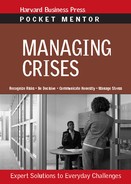To Learn More
Articles
Argenti, Paul. “Crisis Communication: Lessons from 9/11.” Harvard Business Review (December 2002).
In this article, executives from a range of industries talk about how their companies, including Morgan Stanley, Oppenheimer Funds, American Airlines, Verizon, the New York Times, Dell, and Starbucks, went about restoring operations and morale after the terrorist attack of 9/11. From his interviews with these individuals, author and management professor Paul Argenti was able to distill a number of lessons, each of which, he says, may “serve as guideposts for any company facing a crisis that undermines its employees’ composure, confidence, or concentration.”
Augustine, Norman R. “Reshaping an Industry: Lockheed Martin’s Survival Story.” Harvard Business Review (November–December 1997).
In this behind-the-scenes story about the effects of the end of the Cold War on industry, Augustine draws important lessons about what industries can do to avoid crises and manage them once they begin.
Harvard Business School Publishing. “How to Keep a Crisis from Happening.” Harvard Management Update (December 2000).
This article contains concise, practical information on how to prevent a crisis and how to handle one while it’s occurring.
Harvard Business School Publishing. “Managing a Crisis.” Harvard Management Update (August 2005).
This article explores the three emotions that combine during a crisis: fear of disaster, anticipation of a potentially positive outcome, and a desire for the crisis to be over. Each pulls you in a different emotional direction; together they create a distinct feeling of stress. And under stress, you feel the pressure to make a decision. But the pressure can push you to make decisions solely to be “doing something.” Thus, people often respond to crises in ways that can aggravate rather than relieve the crisis. The authors explain how to avoid these futile and often harmful responses.
Mitroff, Ian I., and Murat C. Alpaslan. “Preparing for Evil.” Harvard Business Review (April 2003).
The authors show how crisis-prepared companies use a systematic approach to focus their efforts. In addition to planning for natural disasters, they divide man-made calamities into two sorts: accidental ones, like the Exxon Valdez oil spill, and deliberate ones, like product tampering. Then they take steps to broaden their thinking about such potential crises. They imagine themselves as terrorists, for instance, or consider threats that would be common in other industries. And they seek creative outside input from investigative journalists, lawyers, and even reformed criminals.
Books
Deming, W. Edwards. Out of the Crisis. Cambridge, MA: MIT Press, 2000.
According to W. Edwards Deming, American companies require nothing less than a transformation of management style and of governmental relations with industry. In Out of the Crisis , originally published in 1986, Deming offers a theory of management based on his famous 14 Points for Management. Management’s failure to plan for the future, he claims, brings about loss of market, which brings about loss of jobs. Management must be judged not only by the quarterly dividend, but by innovative plans to stay in business, protect investment, ensure future dividends, and provide more jobs through improved product and service. In simple, direct language, he explains the principles of management transformation and how to apply them.
Grove, Andrew S. Only the Paranoid Survive: How to Exploit the Crisis Points That Challenge Every Company. New York: Bantam Books, 1999.
Andrew Grove, chairman of Intel Corporation, outlines his inside experience and the ups and downs of Intel. He gives the reader a great inside look at the way change from every quarter can affect a major corporation, and he shares his vision in practical, direct language for capitalizing on change and crisis.
Harvard Business School Publishing. Harvard Business Review on Crisis Management. Boston: Harvard Business School Press, 1999.
This collection of eight essays highlights leading ideas on how to deal with difficult situations, crises, and other sensitive topics in a business environment. Obtaining the managerial skills and tools to effectively manage or avoid these crises is critical to the survival and success of your organization. In the lead article, “Managing the Crisis You Tried to Prevent,” Norman Augustine uses his extensive personal experience in many executive situations to break down crises into predictable stages, with advice on how to handle each one. Other articles in this compilation give practical advice from frontline people on such topics as layoffs, product recalls, executive defection, media policy, and leadership.
Hurst, David K. Crisis and Renewal: Meeting the Challenge of Organizational Change. Boston: Harvard Business School Press, 2002.
Hurst presents a radically different view of how organizations evolve and renew themselves. The author tracks a cross-section of enterprises from their creative beginnings through the institutionalization of their success. Using a model of organizational ecocycles, he argues that managers need to create deliberate crises to preserve their organizations from destruction and to renew them with creativity and meaning.
